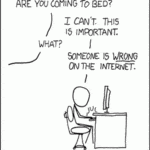Brain Spin: Arguing with No One In the Middle of the Night

“Arguing with No One In the Middle of the Night” might sound like a Zen koan. I am not going to go all guru on you. I promise. This is a quick lesson in verbal self-defense for brain spin in the middle of the night.
So many people find themselves thinking-thinking-thinking-thinking in the middle of the night. Have you ever had a brilliant result from all that thinking? Probably not. And if you did come up with something great, there’s a good chance you forgot it by morning.
Here are some simple things that can shut down what I call “brain spin”:
Positive statements:
Telling yourself something that is true and settling. Example:
“I could have leukemia!” versus “I will know how serious this is when the blood tests come back.” The goal is to stick with the known facts and tell yourself to stop guessing at all the terrible things that have not happened and might not happen.
This how using positive statements works:
- “I could have leukemia!” –“I will know how serious this is when the blood tests come back.”
- “I could have leukemia!” –“I will know how serious this is when the blood tests come back.”
- “BUT, I could have leukemia!” –“I will know how serious this is when the blood tests come back.” “I could also have a really bad flu. I will know when I get the blood tests back” (Notice that I am no longer saying “serious.”)
- “I could have mono and lose a month of work!” –“I will know that when I get the blood tests back”
- “When will they come back?” “Tomorrow or the next day”…. “
- “I can’t wait, what if I have leukemia?” “I will know that when I get the blood tests back.”
- “But, what if?” “I will know that when I get the blood tests back. If something is wrong, the doctor will know more than I can guess at in the middle of the night.”
- “But, what if?” “The doctor will tell me and I’ll check it out.”
- “But, what if?” “There’s no doctor in this bed, go to sleep! I will know that when I get the blood tests back.”
If this kind of “brain spin” goes on for more than 15-20 minutes:
Get out of bed. Go to a dimly lighted room. If you are vaguely hungry, eat something that is slightly starchy or protein with some fat (examples: a bowl of cold cereal with milk or yogurt or toast and warm milk). If you have muscle tension, have a warm shower. If you feel good, but have a racing mind, distract your mind with something neutral, but engaging (examples: word search puzzles, Sudoku, crossword puzzles, reading an engaging book or magazine article, listening to music with a headphone).
When you perceive that you are tired, go back to bed.
Other examples of runaway night thoughts:
To-do lists: “I scheduled to pack between 8-10 tomorrow night” versus “I have to pack my bags! What should I bring?”
The trick to letting go of to-do lists is to remind yourself that you set time aside the next day to make the decisions. If you start packing in your head, you can spend hours deciding what shirt to wear, so don’t start packing in your head.
Conflicts: “This relationship will go on (or not). My goal is to establish that I will do X, but not Y, in the future” versus “I have to deal with that !%@#%@#! I should have said ____! If she says ____ I’ll say %&*(%&!”
The positive thought is to commit to your goals. Repeat them to yourself, so that you are prepared to get your needs met. If you start having hypothetical conversations, you can spend hours creating an argument that probably has no similarity to the argument you will have, when you actually talk to the person.
The key to stopping brain spin is to remind yourself:
- Your body and mind need rest to do whatever you are thinking about.
- You will solve it better when you are awake during the day.
- You will solve it better if you sleep now.
- Don’t hesitate to get up and distract yourself.
